There have been countless footballers over the years who have mesmerised us with their blistering pace both on and off the ball. Memories of Gareth Bale’s amazing run that beat Marc Bartra and Barcelona in the Copa Del Rey final of 2014 are still fresh in the memories of Madridistas and football fans across the world.But apart from their pace, Bale and his contemporaries such as Cristiano Ronaldo and Lionel Messi also have an amazing overall skill set and are armed with incredible ability on the ball, vision, and an eye for goal that has seen them go on to become household names. Yet, there have been footballers, who despite lacking any other skill to speak of, have still made some sort of impact based on sheer pace alone.We take a look at six footballers who have relied solely on their pace for success.
#1 Antonio Valencia
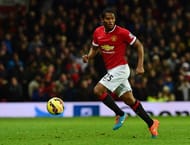
In his prime, Antonio Valencia was arguably one of the best wingers in the world and certainly one of the fastest. In fact, as recently as May 2015, he was named the fastest player in the world by FIFA, with the world governing body clocking the Manchester United wide-man running at 35.1 km/hr last season.
The surging Ecuadorian is a fearsome sight for retreating left-backs who find themselves simply unable to deal with the pace of United’s number 25. Being the soft-spoken player that he is, his contributions to the United team have often gone unnoticed.
Valencia played a crucial role, particularly in the 19th and 20th title triumphs of Manchester United under Sir Alex Ferguson, and at times looked unplayable on the right wing. The 2011/12 season saw him display the full extent of his abilities as arguably United’s best attacking outlet that year and was rightly named United’s Player of the season.
However, since Ferguson’s exit, Valencia has been on a downward spiral. In Fergie’s last season at the club, Valencia seemed weighed down by the pressure when donning the iconic United no.7 kit. After reverting back to his old number 25, during David Moyes’ short stint, Valencia recovered some of his form but United fell to previously unseen depths.
The arrival of Louis van Gaal has seen the Ecuadorian being started more and more as a right-back. But the 30-year-old, despite possessing the defensive nous for the role, has struggled in defence. For instance, against Wolfsburg in the Champions league, he ended up being partly culpable for Wolfsburg's opener in the fifth minute when he played Daniel Caligiuri onside before he slotted past David De Gea. Valencia was taken off at half-time and replaced by Ashley Young.
As Ronald Koeman aptly put it, “Valencia has lost some of that great pace he once had, and it is more difficult for him to get past players when his starting position is so deep.”
#2 David Odonkor

Odonkor is a typical examle of a player who used his speed to temporarily compensate for his lack of other skill sets. In fact, Odonkor has clocked an official time of 10.6s for the 100m.He first burst onto the international scene as a substitute for Germany in the 2006 World Cup, as Jurgen Klinsmann looked to take advantage of his blistering pace to get at tiring opponents.
Sadly, the Borussia Dortmund youth academy product also showed that pace alone isn’t all it takes to cut it at the top level. His erratic use of the ball meant he was never able to cement a place in the starting lineup for Die Mannschaft. Even at Dortmund, he had just one season where he featured regularly in 2005/06 after which he courted interest from Real Betis.
His career at Betis was something of a horror story, with a serious knee injury sidelining him for most of his first season, only to injure himself again in his second year soon after his comeback. He showed promise after his second recovery, only to undergo a knee surgery for the third time in his Betis career soon afterward.
Age and injury saw him lose his pace, his only selling point, and resulted in him move to a string of lower division clubs across Europe. And in 2013, after being injured for several months, Odonkor ended his professional career as a footballer.
#3 Kyle Walker
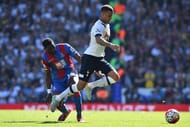
Walker is arguably one of the quickest full-backs in the Premier League. He has been the first choice right-back for Tottenham Hotspur since replacing Vedran Corluka in the 2011/12 season. It was a season that saw him win the PFA Young Player of the Year, beating luminaries such as Sergio Aguero, Danny Welbeck, Daniel Sturridge and his teammate Gareth Bale to snatch the award.
Walker’s tactical positioning was questionable and was heavily suspect defensively, but he added dynamism to a Spurs side that had previously featured a ponderous Corluka at right-back. Spurs fans were endeared by his bombing runs forward that led to many an attacking chance that season. However, what was notable was that Walker was heavily – almost entirel – reliant on his pace to get him out of situations.
With age, it was thought his defensive acumen would improve. But so far in his career he has not rectified any of the basic errors he makes when defending. He is rarely goal side of his attacker and he is prone to leaving huge gaps between himself and the centre-back. But Walker’s electric pace always seems to get Spurs out of sticky situations of his own making.
At only 24 years of age, Walker still has time on his side. However, as his career progress, his pace will fade and he will have to rely on his ability to read the game – something that has not seen progress in the last four seasons.
It will be interesting to see how he adapts to this change. Otherwise the zenith of Walker’s career may as well be his first season as a starter at Tottenham.
#4 Jonathan Biabiany
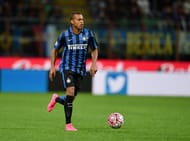
Jonathan Biabiany is a French footballer who plays for Italian club Internazionale (aka Inter Milan). Known primarily for his pace on the ball and his incredible acceleration, the 27-year-old winger is now back at Inter where he began his career as a youth player back in 2004.
His has been a bizarre career that saw him initially shipped off on loan spells to Chievo, Modena and then Parma. Parma then purchased half the rights for him, but Inter bought him back outright the very next season, only for them to sell him off in the next season to Sampadoria in a deal for Giampaolo Pazzini.
He would then move back to Parma, on loan and then on a co-ownership deal, only for him to discover a heart condition that kept him on the sidelines for 11 months. Recovery from his illness has seen him join the Nerazzurri for again this season.
In his heyday, he was arguably the fastest player in Serie A, and it remains to be seen whether Biabiany will ever reach those heights post illness. While he is comfortable on the ball and surprisingly strong in the air, there are aspects of his game that have been a stumbling block to him; finishing being foremost among them. One just has to take a look at his statistics to note that it is certainly not one of his strong points.
His best tally in a season is only six goals, which he achieved with Parma in 2009/10, 2011/12 and 2013/14. If Biabiany could add goals to his game, he would be a much more potent player altogether.
#5 Aaron Lennon
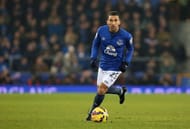
Aaron Lennon is one of those people who seem to have been around forever and yet is aged only 28. The English winger who moved to Everton this summer has spent the best part of his professional football life with Tottenham Hotspur after signing from Leeds United in 2005. He had made his Premier League debut in 2003 as the youngest player in the Premier League at the age of 16 years.
There was a time not too long ago when it was almost a given that Lennon would win an England cap every time the Three Lions went out to play, even inheriting David Beckham’s iconic no.7 shirt. Lennon was a standout winger for Spurs for the best part of his time there.
Defenders would be caught out by the flash of white as he rocketed past them. His speed was synonymous with the free-flowing ethos etched into the fabric at White Hart Lane. But times have changed, and a lack of goals and sporadic final ball – frustrating from a player whose ability to excite is as potent as any other – has seen him shipped off to Goodison Park.
Not offering the trickery of Erik Lamela, or the directness of Nacer Chadli or Andros Townsend, Lennon was no longer part of Mauricio Pochettino’s plans. And with his pace diminishing, he could no longer outstrip left-backs as frequently as he once had.
Lennon is far from done though, and at 28 he can still revitalize his career in the blue of the Merseysiders. He can still beat a man with his pace or at least put him on the back-foot. His natural inclination is to just drive at defenders and let his pace take care of the rest and this has often been his undoing.
Allowing himself a little more time to think on the ball, and making the right choices, might help him adapt his game as he begins to lose his pace.
#6 Jesus Navas
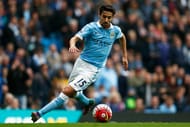
Jesus Navas has often seemed to play a bit-part role since his move to Manchester City from Sevilla in 2013, but don’t let that take anything away from the man. His pace is often underestimated and defenders have paid dearly for it.
The Spanish winger is lightning fast and has even clocked 100metres in 10.8 seconds. In fact, contrary to popular belief, Navas has actually played a major role for City last season as he made 42 appearances across all competitions for Manchester City, racking up 8 assists in the league – the most by a Man City player.
His insane pace gives him an advantage and more often than not he comes out triumphant in one-on-one situations with opposition full-backs. And the fact that he is a compulsive crosser sees him set up many a chance for the Citizens.
He has had his fair share of criticism at the Etihad so far though, and has oft been derided for being unable to complete his attempted crosses or even outright missing the target man when he takes up set-piece duty. He has also not been able to come up with goals when his teammates have teed him up and he has only had the goalkeeper to beat.
Quite why he is the target for criticism, on the other hand, remains something of a mystery. Particularly when one considers the value money he has proven to be in comparison with some of City’s other big-money signings in recent years. After signing from Sevilla for just £14.9 million, over the last two seasons, he has assisted more league goals (15) than any other City player. Unlike most wingers of his mould, he possesses an excellent work-rate as well. He lacks the ability to tackle well, but uses his pace to track back and help out his full-backs.
A player who, for the most part, shuns the spotlight, this very trait could be the reason for Navas being as underrated as he is. Granted, his play is often one-dimensional, and relies heavily on his pace. But the impact that Navas has, just by entering a game and providing added impetus, will prove to be crucial for City, or wherever he may go, at least until his pace wears out.
